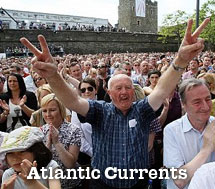Long Fought Human Rights Victories Show the Importance of Staying the Course
Resource type: News
Gara LaMarche |
 A core premise of Atlantic’s approach to philanthropy, underlying our plan to spend the foundation’s assets by the end of this decade, is that addressing issues now can prevent them from becoming larger, more serious challenges later. But investing now doesn’t always mean that change will come about quickly.
A core premise of Atlantic’s approach to philanthropy, underlying our plan to spend the foundation’s assets by the end of this decade, is that addressing issues now can prevent them from becoming larger, more serious challenges later. But investing now doesn’t always mean that change will come about quickly.
It’s easy to weary, and tempting to move on, when fights are long and hard, and the promise of change seems too distant to imagine. But change does happen, thanks to the tenacity and vision of front-line advocates. Along with them, Atlantic has recently celebrated two long fought and hard won victories in Northern Ireland and South Africa that I’d like to tell you about, and then say a few words about what that tells us about two social change battles now going on in the U.S.
Tuesday, June 15, 2010 was a profound and historic moment for justice and peace in Northern Ireland – an area of focus for Atlantic since we began funding there in the early 1990s. After a 12-year investigation, the results of the Bloody Sunday Inquiry, also known as the Saville Report, were released, finding the killing of 14 unarmed civilians by the Parachute Regiment in Derry’s Bogside on January 30, 1972 unequivocally “unjustified.” The report confirmed that British soldiers had lied to conceal their acts, invalidating the findings of the Widgery Inquiry in 1972, which had exonerated the British soldiers and labeled the demonstrators as rioters.
The Bloody Sunday Inquiry, and Prime Minister David Cameron’s earnest apology, were late but crucial vindication for the families of the victims who have campaigned assiduously for 38 years to gain justice and clear the names of their loved ones. A number of Atlantic’s grantees, most notably British Irish Rights Watch, also played an important role in supporting the families and getting the inquiry established. Atlantic’s Northern Ireland Country Director and Director of our Reconciliation & Human Rights Programme, Martin O’Brien, noted that “it was quite remarkable to see the crowd of some 10,000 people assembled in Derry applauding a Tory British Prime Minister as he wholeheartedly apologised for events 38 years ago.”
Though the recognition of wrongdoing can in no way undo the tragedy and injustice of that terrible day in 1972, it gives significant hope for reconciliation and peace into the future.
Last month, South African Atlantic grantees also celebrated a victory after a long fought battle when the Constitutional Court declared the Communal Land Rights Act of 2004 as invalid and unconstitutional. The Court’s judgement comes after six years of activism and legal challenges in the lower courts.
The case was brought by four communities from the Limpopo, Mpumalanga and North West provinces and supported by grantees the Legal Resources Centre and the Rural Women’s Action Research Project. The ruling was hugely significant because it affects the rights of almost 24 million people who live in so-called “communal areas” – the remnants of tribal kingdoms or chieftaincies where traditional or customary law still holds sway. The Communal Land Rights Act would have further entrenched traditional or customary law and handed control of communally owned land over to unelected traditional leaders who do not always reflect the interests of local communities.
 The case argued that the Act violated the Constitution because it restored “apartheid-era tribal units” and would have given traditional leaders undemocratic and unprecedented powers and undermined women’s rights and black ownership of land.
The case argued that the Act violated the Constitution because it restored “apartheid-era tribal units” and would have given traditional leaders undemocratic and unprecedented powers and undermined women’s rights and black ownership of land.
Though this long fought battle is an important victory for the millions of people who live in rural communities in South Africa, our grantees are remaining vigilant to ensure that new legislation does not repeat the same violations present in the Communal Land Rights Act. They’ve launched a campaign to inform people in rural communities of the outcome of the case and to ensure that they, particularly women, can enjoy their rights under the constitution.
When I think about these victories – how long it took to achieve them, and how much remains to be done – I gain some perspective on two campaigns in which Atlantic and our grantees have been heavily engaged in the United States.
As I’ve written in previous columns, the United States celebrated a monumental victory earlier this year with the passage of health care reform – a battle that has been fought for more than half a century. Yet when asked at a recent Atlantic event on health care what lessons we learned from the battle, Washington Post columnist E.J. Dionne underscored the need for tenacity and stick-to-itiveness in words from his young son’s little league baseball coach: whenever things get tough or things get in your way, “keep coming at them!”
And surely tenacity is needed. Not only to improve upon the compromises made to enact the bill, but to fight an aggressive backlash in which some state legislatures and attorneys general are pressing for repeal or – in the revival of a term used by opponents of civil rights laws – “nullification” of the new law. Moreover, there are considerable challenges of making the law work for its intended beneficiaries. That’s why after the bill’s passage, Atlantic pulled together a team of staff from our Ageing, Children & Youth, Reconciliation & Human Rights and Advocacy departments to coordinate investments in grantees working on issues of implementation, particularly for older adults and children, and to provide targeted support for defense of the new law.
A victory that still lies ahead – a path to citizenship for 12 million undocumented workers and families in the U.S. – has in recent weeks seemed more distant, as the State of Arizona and, just this week, a town in Nebraska, passed draconian and discriminatory anti-immigrant laws, and comprehensive reform seems mired in partisan struggles in Washington. But these setbacks have only sharpened the issues at stake, and a few days ago we approved an additional $2.5 million grant to Reform Immigration for America, the campaign that is leading the battle for reform.
The fight for social justice is not easily won, and never really over. But as these recent victories demonstrate, hard work and tenacity, and keeping an eye on the end goal, no matter what obstacles lie in the path, can change the course of history and make profound change for millions of people throughout the world.
Gara LaMarche